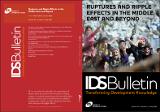| dc.contributor.author | Selby, Jan | |
| dc.contributor.author | Tadros, Mariz | |
| dc.date.accessioned | 2016-05-20T09:24:42Z | |
| dc.date.available | 2016-05-20T09:24:42Z | |
| dc.date.issued | 2016-05-19 | |
| dc.identifier.uri | https://opendocs.ids.ac.uk/opendocs/handle/20.500.12413/11628 | |
| dc.description.abstract | Perhaps more than any other region or any other period of post-Cold War history,
the Middle East since the Arab Spring constitutes a significant challenge to established ideas about development and its relationship with conflict. The failure of democracy movements, the collapse and rebirth of authoritarian regimes, the regional conflagration around Syria, new experiments with Islamism, and the return of geopolitics all, in one way or another, challenge these established ideas. The Middle East has always been something of an outlier within development thinking and practice: both the discipline of development studies and development policy have always taken sub-Saharan Africa, South Asia and Latin America as their central reference points, not the Middle East. But with so much international attention currently on the Middle East, it is worthwhile examining what recent trends and events there tell us about development and the role of conflict therein; this is what is done in this IDS Bulletin.
Broadly, the articles consider myths around conflict and development about the Middle East region. These include: that there is a unilinear model of development; that low development and violent conflict are natural bedfellows; that there is an alternative rentier path of development; that fragile statehood is the main institutional cause of violence; that environmental scarcities are an increasingly important contributor to conflict; that countries need to pass a number of milestones on a democratisation pathway; that more humanitarian aid will contain the Syrian refugee crisis and that, following a period of ‘Arab Spring’, people’s agency has been defeated. | en |
| dc.language.iso | en | en |
| dc.publisher | Institute of Development Studies | en |
| dc.relation.ispartofseries | IDS Bulletin;47.3 | |
| dc.rights | This is an Open Access article distributed under the terms of the Creative Commons Attribution 4.0 International licence, which permits unrestricted use, distribution, and reproduction in any medium, provided the original authors and source are credited. http://creativecommons.org/licenses/by/4.0/legalcode | en |
| dc.rights.uri | http://www.ids.ac.uk/files/dmfile/IDSOpenDocsStandardTermsOfUse.pdf | en |
| dc.subject | Politics and Power | en |
| dc.title | Ruptures and Ripple Effects in the Middle East and Beyond | en |
| dc.type | Series paper (IDS) | en |
| dc.rights.holder | Institute of Development Studies | en |
| dc.identifier.team | Power and Popular Politics | en |

